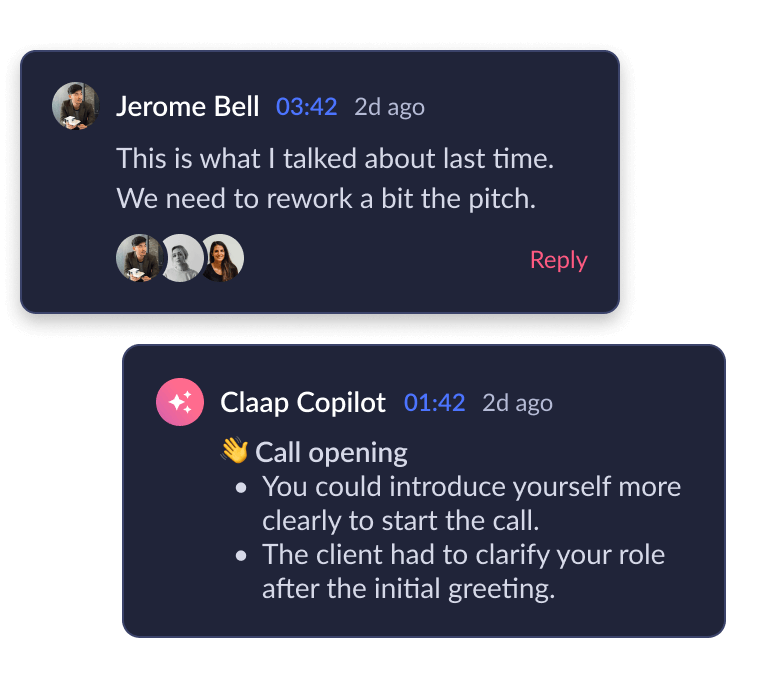In this guide, we’ll unpack what Conversation Intelligence is and why in 2025 it’s a must-have for modern sales orgs. We’ll share real use cases, and what to look for in a platform.
Let’s take the example of Emma, who manages a 10-person sales team. Every week, she’s buried under call recordings, half-filled CRM fields, and deep dives into email loops. Her reps say they’re following the playbook, but the numbers say otherwise. She doesn’t have time to jump into all sales meetings or listen to 50 hours of calls. She needs patterns. Fast.
Emma isn’t alone. Most revenue managers struggle to have a good pipeline visibility and level up their reps, because they can’t review every conversation. Critical signals get lost — objections, pricing pressure, competitor mentions, missed cues, unidentified champions — and the result is slower ramp time, stalled deals, and guesswork.
👉 Conversation Intelligence (CI) helps revenue teams unlock the insights hidden in every sales call — by automatically recording, transcribing, and analyzing calls to surface what moves deals forward (or stops them cold).
.jpeg)
What is Conversation Intelligence?
You’re sitting on your most valuable sales data — and ignoring 90% of it.
Every call your team makes holds valuable insights: why deals move forward, why they stall, how prospects respond, and where competitors emerge. But most of that knowledge disappears the moment the call ends.
The best platforms don’t just transcribe calls. They understand, using a blend of speech recognition, natural language processing (NLP), machine learning and GenAI. Claap, a leading conversation intelligence software, offers a range of benefits:
- Identifies objections the moment they’re raised, and before they spiral
- Reveals how your top reps position the value proposition, pricing, and benefits — and how prospects respond.
- Flags competitor mentions and emotional tone shifts, to track deal risks in real time
- Surfaces critical moments that dismantle buyer hesitations and accelerate closes
Instead of manually reviewing recordings or relying on memory, you and your team gets access to what really happened — and what to do next.
👉 That’s what Conversation Intelligence is. It’s how modern sales teams stop guessing and start scaling what works — based on real conversations.

Conversation Intelligence is no longer fringe.
Analysts agree it's becoming foundational. Forrester forecasts a shift from experimentation to execution in 2025, with CI tools now core to sales and customer support performance, driven by ROI and process improvement.
Meanwhile, Gartner predicts that 85% of customer service leaders will explore or pilot conversational GenAI tools — including Conversation Intelligence solutions — this year, with business units, not IT, leading adoption.
The bottom line? Conversation Intelligence is now a must-have layer in your modern revenue stack.
Conversation Intelligence vs Conversational AI: Know What You’re Buying
While some confuse "Conversational AI"(a broader term for Gen AI or AI agents conversations) with "Conversation Intelligence" (sales-focused tooling), in this piece, we focus on the latter — tools that analyse calls to drive sales performance.
If you want to understand what happens in your sales calls, and act on it, you're looking for Conversation Intelligence.
How Conversation Intelligence Works
Think of CI as your real-time sales lab — running in the background of every conversation.
Here’s how it works:
- It captures every call across video, voice, and chat. Automatically. No one forgets to hit “record.” No moment gets missed.
- It transcribes calls with high accuracy, turning raw dialogue into clean, searchable text — even in noisy environments or across accents.
- It reads between the lines. And flags hesitation just before a pricing question. It knows when a buyer goes cold at the end of a renewal call. It identifies talk-time dominance and emotional drop-offs in real-time, not after the deal is lost.
- It surfaces the conversation insights that matter, not as raw data dumps, but as structured, shareable takeaways that drive action. The exact objection that killed a deal, highlight reels from your top closer’s discovery calls and coaching moments ready to use.
And because the AI improves with every conversation, your sales process gets sharper every time someone picks up the phone.

What Happens When Conversation Intelligence Tools Work
Conversation Intelligence isn’t just a dashboard. It’s a behavioral shift that changes how reps engage prospects with precision, how managers deliver targeted coaching, and how revenue teams align to accelerate growth.
“Reps spend 70% of their day on admin. CI gives that time back.” – Salesforce & HubSpot, 2024
A - Sales Reps sell, not scribble
- Most reps spend just 30% of their day selling, and the rest buried in admin: CRM updates, call notes, scheduling, chasing.
- CI tools cut through that noise.
- They capture the call, surface key insights, and generate structured recaps — freeing up time for what actually drives revenue.
B - Sales Managers coach with context
- No more guesswork.
- CI gives sales managers a bird’s-eye view across hundreds of calls, filtered by team, individual, or deal stage.
- All of this to identify patterns, missed cues, and coachable moments.
C - RevOps Teams see the full funnel
- From messaging resonance to objection trends, CI tools reveal what’s actually happening in deals and the sales pipeline — not just what’s logged in the CRM.
- Claap helps revops teams boost sales efficiency by turning scattered conversations into one clear source of truth.

Best Conversation Intelligence Tools for Sales Teams in 2025
There’s no one-size-fits-all conversation intelligence platform. Each tool brings different strengths depending on your team’s needs — from pipeline visibility to AI-powered meeting notes. Here’s how the top players compare:
Want the speed, simplicity, and clarity that teams actually use? Let’s take a closer look at Claap.
Looking to compare tools in depth? Don’t miss our full guide to the top 10 conversation intelligence platforms in 2025.
The Claap Advantage — Designed for Sales That Scale
Feature 1: High-fidelity transcription that doesn’t fall apart under pressure
Most tools claim 95 %+ accuracy. Claap earns it — even on real-world calls filled with accents, crosstalk, industry jargon, and background noise.That means:
- You don’t need perfect call hygiene to get perfect data
- Transcripts you can trust, not clean up
- Less time correcting, more time acting
.jpeg)
Feature 2: Intelligent tagging that finds what your team missed
Claap AI-powered analysis doesn’t just listen — it learns. It detects objection patterns, talk ratios, and emotional dips in real time, helping your team spot what matters before opportunities slip away:
- Objection clusters across territories
- Sentiment drops that flag churn risk
- Competitor mentions a spike in Q3
It’s not just AI. It’s applied intelligence, embedded where sales decisions get made.
💬 Sandro Maag, Global Head of Sales at Kemiex
Claap has been a game-changer for us. The ability to capture critical meeting information and provide valuable insights that drive action, has transformed how we approach sales.
👉 Learn how Kemiex turned sales calls into actionable insights here.

Feature 3: CRM sync that supports your reps (not just your ops team)
Claap integrates with Salesforce, HubSpot, Attio, Pipedrive and more — but not just to log data. It:
- Turns calls into structured, tagged summaries — saving 10–15 minutes per rep
- Syncs insights directly into the opportunity record for instant access
- Auto-fills critical CRM fields directly from raw conversations.
Claap connects with your full sales stack — from you CRM tool to Slack, Notion, and Zoom.
This is where CI stops being a manager tool and becomes a rep’s secret weapon.
Feature 4: Coaching that scales — with receipts
Claap’s sales coaching software helps you build a coaching culture that sticks:
- Claap uses sentiment analysis to flag moments of uncertainty, before the deal goes sideways
- Turns top rep calls into tagged playlists
- Auto-scores calls on talk ratios, objection handling, and clarity
- Shares “game tape” across the team with comments
Every manager says they want more coaching. Claap makes it easy to prove that effective coaching is happening.
💬 Claire Heskin, CRO at Ronspot
We’re averaging around a 33% demo conversion rate. That’s improved since using Claap. We can make sure the right messaging is landing and coach the team better.
Claap wasn’t built to impress with buzzwords. It’s built to get your revenue team aligned around what works — and make that repeatable.

From Rollout to Ritual: Making Conversation Intelligence Stick
The biggest challenge with Conversation Intelligence isn’t technical. It’s human. You’re introducing a tool that records, analyses, and scores conversations.
That’s a trust issue. A workflow issue. A culture issue.
If you want adoption, you have to earn it. Here's how winning teams do it:
1. Start with champions, not mandates
Your most vocal rep is your best asset — or your worst enemy.
Pick one respected rep and one proactive manager. Let them pilot Claap first. Their feedback builds your internal playbook. Their wins build your proof.
2. Show the payoff in 24 hours
Reps don’t want to “review their performance.” They want to close deals. In your first week:
- Show a win where a deal closed because of something learned in Claap
- Share a real example where Conversation Intelligence flagged a risk that no one caught
- Highlight time saved: “10 minutes saved on every call recap” hits differently
3. Integrate into existing behaviour, not on top of it
Don’t add “review the call in Claap” to a checklist. Instead:
- Sync insights directly to tools like Slack, Notion or your CRM
- Turn playlists into onboarding tools
- Use Claap clips in pipeline reviews or 1:1s
If it lives in the tools your team already uses, it becomes second nature.
4. Frame it as performance enablement, not surveillance
Here’s the truth: some reps may resist if it feels like surveillance.
But they rally behind tools that help them sell, crush quotas and cash their bonuses. What works:
- Call it a feedback loop, not a compliance layer
- Share best calls publicly, not worst ones
- Let reps tag and review themselves — flip the ownership
5. Give managers a coaching engine, not just a transcript dump
Without structure, even the best call analysis ends up in a folder no one opens.
Claap turns every manager into a force multiplier:
- Auto-scored calls
- Filters by objection type
- Playlists based on pipeline stage or rep performance
That’s how you scale coaching — without adding another meeting.
Software gets bought. Adoption gets earned. Conversation Intelligence works because it cuts through the noise to deliver real, actionable insights that add true value.

To Wrap Up
Every sales call tells a story. Most teams never hear it — because they’re too busy moving on to the next one. The pitch gets delivered. The prospect says, “Maybe.” The data disappears.
Conversation Intelligence changes that. It listens, but more importantly, it remembers. It identifies patterns, reveals the truth, and helps your team improve with every call.
Claap exists for teams who are tired of guessing and transforms messy call data into data-driven insights your team can act on (or even your "Sales AI Agents").
See what your sales calls are really saying! Request a demo or try Claap for free today.
{{BANNER}}
FAQs
Still have questions? You're not alone. Here are some of the most common things we hear from teams exploring conversation intelligence.
1. What are the top Conversation Intelligence tools?
Some of the best-known CI platforms include: Claap, Gong, Chorus, Modjo, tl;dv, Avoma, Zoom AI. Each has strengths depending on your team’s needs — from call summaries to deep sales coaching analytics.
2. What’s the difference between Conversation Intelligence and Conversational AI?
CI analyses conversations. Conversational AI powers them. CI helps you learn from customer conversations — it listens, transcribes, and pulls insights. Conversational AI simulates human interactions (e.g. chatbots). If you want to understand why deals are won or lost, you’re looking for CI.
3. How much does Conversation Intelligence software cost?
Pricing depends on features, usage volume, and support. Some platforms charge for transcription hours, analytics, integrations, or user seats. Be sure to compare the total cost of ownership, not just the license fee.
4. Can CI integrate with Salesforce and HubSpot?
Claap integrates directly with platforms like Salesforce, HubSpot, and others. This ensures that call summaries, insights, and tags sync into your CRM — no copy-paste required.
5. Is Conversation Intelligence GDPR compliant ?
Compliance features to look for include consent prompts, data anonymisation, end-to-end encryption, and clear data storage policies. Claap meets enterprise-grade compliance standards, including SOC 2 and GDPR.
6. What insights can CI provide?
CI tools provide conversation insights, customer sentiment analysis, call data, and key moments that impact the sales pipeline.
7. What’s the ROI of using CI tools?
Teams using Claap report faster onboarding (2X), 30% higher close rates, and a 50% increase in sales capacity.
FAQ

![What is Conversation Intelligence? [+ 2025's most impactful use case]](https://cdn.prod.website-files.com/6262a9705cabe0833039d5c8/6942d60fda0052bf4db984e2_Conversation-Intelligence.jpg)




